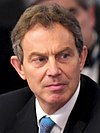Bush–Blair 2003 Iraq memo
This article needs additional citations for verification. (October 2010) |

The Bush–Blair 2003 Iraq memo or Manning memo is a secret memo of a two-hour meeting between American President George W. Bush and British Prime Minister Tony Blair that took place on 31 January 2003 at the White House. The memo purportedly shows at that point, the administrations of Bush and Blair had already decided that the invasion of Iraq would take place two months later. The memo was written by Blair's chief foreign policy adviser, David Manning, who participated in the meeting.
The memo has become controversial for its content, which includes discussing ways to provoke Saddam Hussein into a confrontation, with Bush floating the idea of painting a U-2 spyplane in United Nations (UN) colors and letting it fly low over Iraq to provoke Iraq into shooting it down, thus providing a pretext for the subsequent invasion.
It also shows Bush and Blair were making a secret deal to carry out the invasion regardless of whether weapons of mass destruction were discovered by UN weapons inspectors, in direct contradiction to statements made by Blair to British Parliament afterwards that Saddam would be given a final chance to disarm.
According to the memo, Bush is paraphrased as saying:[1]
The start date for the military campaign was now pencilled in for 10 March. This was when the bombing would begin.
Bush also said to Blair that he "thought it unlikely that there would be internecine warfare between the different religious and ethnic groups" in Iraq after the war. Five pages long, and classified as extremely sensitive, the existence of the memo was first alleged by Philippe Sands in his book Lawless World (2005). It was then obtained by American newspaper The New York Times, which confirmed its authenticity.[2]
UK Liberal Democrat party leader Menzies Campbell said, with regard to the memo: "If these allegations are accurate, the Prime Minister and President Bush were determined to go to war with or without a second UN resolution, and Britain was signed up to do so by the end of January 2003."[3]
See also
[edit]- Bush-Aznar memo
- Casus belli
- Downing Street memo
- 2004 Iraq document leak
- September Dossier
- Iraq Dossier
- Butler Review
- Iraq Inquiry
- Yellowcake forgery
- Plame affair
- Propaganda
- Dr. David Kelly
- Operation Rockingham
- Hussein Kamel al-Majid and his Testimony for UNSCOM 8-22-1995.
- Iraqi aluminum tubes
- Project for the New American Century
- Wolfowitz Doctrine
- Bush Doctrine
- Scott Ritter
References
[edit]- ^ "Bush-Blair Iraq war memo revealed". BBC News. March 27, 2003.
- ^ Van Natta Jr., Don (March 27, 2006). "Bush Was Set on Path to War, Memo by British Adviser Says". The New York Times.
- ^ "Blair 'backed Iraq war while seeking UN resolution'". The Irish Times. February 2, 2006. Retrieved February 10, 2018.
External links
[edit]- The White House meeting that took us to war By Oliver King, Guardian Unlimited, February 2, 2006
- Blair-Bush deal before Iraq war revealed in secret memo by Richard Norton-Taylor, The Guardian, February 3, 2006
- Bush 'tried to lure Saddam into war using UN aircraft' by Rosemary Bennett and Michael Evans, The Times, February 3, 2006
- Fresh claims about the build-up to Iraq war by BBC World Service, February 3, 2006
- Bush Was Set on Path to War, Memo by British Adviser Says by Don Van Natta Jr., New York Times, March 27, 2006
- 2003 in the United Kingdom
- 2003 in the United States
- Causes and prelude of the Iraq War
- George W. Bush administration controversies
- Memoranda
- Political scandals in the United Kingdom
- Presidency of George W. Bush
- Iraq War documents
- Premiership of Tony Blair
- United Kingdom–United States relations
- Labour Party (UK) scandals



